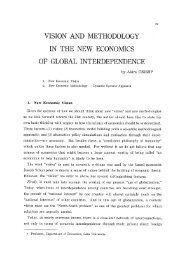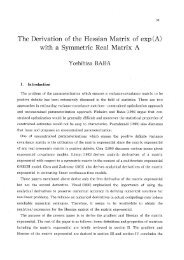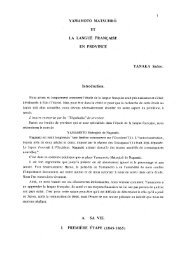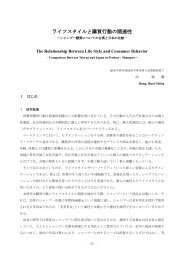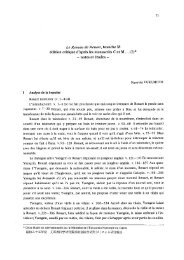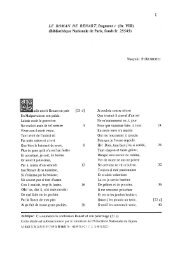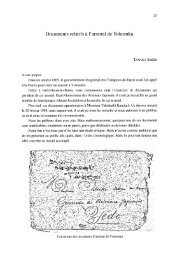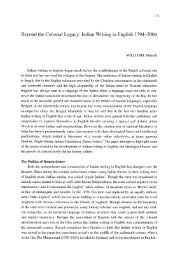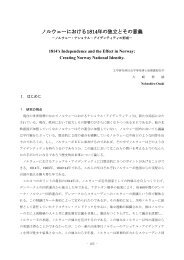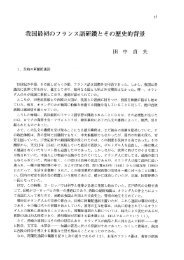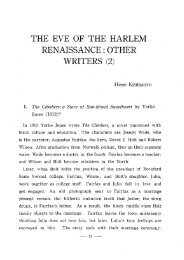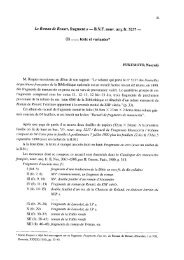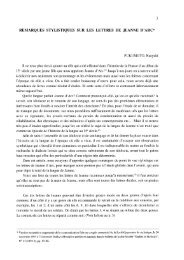New Historicism and Literary Studies - Soka University Repository
New Historicism and Literary Studies - Soka University Repository
New Historicism and Literary Studies - Soka University Repository
Create successful ePaper yourself
Turn your PDF publications into a flip-book with our unique Google optimized e-Paper software.
which questioned the traditional theories of truth <strong>and</strong> knowledge <strong>and</strong> introduced an indefinite<br />
"quest" after the fact in anthropology .55 In the beginning symbolic anthropology was "suspected<br />
as European, literary, or worse, philosophical." And to quite an extent those suspicions were<br />
well founded. In an attempt to restructure anthropology <strong>and</strong> formulate graduate programs in it,<br />
anthropologists overhauled curricula driven beyond the boundaries of their discipline into an<br />
area of new intellectual practices arising out of a combination of "the linguistic, the<br />
interpretative, the social constructionist, the new historicist, the rhetorical, or the semiotic."56<br />
Now the ethnographer's task was not only to reconceptulalize his discipline but to adapt the<br />
new methodologies to his discipline. In Available Light, Geertz explored issues in political<br />
philosophy, religion <strong>and</strong> psychology through a postmodernist <strong>and</strong> multiculturalist perspective.<br />
Here he brought to the surface the symbolic significance of the concepts of nation, country,<br />
identity or self <strong>and</strong> how their unstable meanings change through time <strong>and</strong> place. But he made<br />
an interesting remark in the beginning of the book, which would gladden the hearts of literary<br />
critics. Geertz wrote," A lot of people don't quite know where they are going, I suppose; but I<br />
don't even know, for certain, where I have been. But all right already. I've tried virtually every<br />
other literary genre at one time or another. I might as well try Bildungsroman."57 Geertz's light-<br />
hearted statement of becoming a novelist <strong>and</strong> writing a Bildungsroman has far-reaching<br />
implication both for anthropology <strong>and</strong> literature. A Bildungsroman narrates the story of the<br />
psychological development <strong>and</strong> moral education of its protagonist, <strong>and</strong> now anthropology is<br />
called upon to do the same. The thin margin that once separated the imaginative text of a writer<br />
<strong>and</strong> the scientific text of an anthropologist has almost disappeared by now.<br />
The interpretative <strong>and</strong> exhaustive method of anthropology has been quickly appropriated<br />
by cultural historians, <strong>and</strong> subsequently by literary critics, more as a narrating practice than as a<br />
cultural theory. <strong>Literary</strong> critics particularly employ the interpretative narrative technique of this<br />
ethnographic model to underst<strong>and</strong> literary culture <strong>and</strong> the literary ethos. Interestingly Geertz's<br />
interpretative ethnography was criticized within the field of anthropology by fellow<br />
anthropologists as reducing economic <strong>and</strong> material conflicts in society to impressionistic<br />
underst<strong>and</strong>ing of local cultures. His use of thick description failed to relate "cultural texts" to a<br />
larger tradition of literary, economic <strong>and</strong> social change.<br />
The Geertzian method of finding indigenous cultural significance to the exclusion of social<br />
laws has drawn criticism from critics such as Roger Keesing, Dominick La Capra, Vincent<br />
Pecora <strong>and</strong> Aletta Biersack.58 These critics point out that cultures can be both mazes of<br />
"mystification" or streets of signification . It all depends on who constructs cultural meaning<br />
<strong>and</strong> interprets culture; <strong>and</strong> what are his ulterior motives.<br />
Naturally new historicist practices have also come under attack. Hayden White in Tropics<br />
of Discourse sees literary conventions <strong>and</strong> linguistic constraints impacting on the writing of<br />
history.59 The historical discourse now becomes a narrative prose discourse that represents past<br />
structures as models in order to explain their meaning. In Metahistory, White sees the historian<br />
functioning as a chronicler of events that happened in the past <strong>and</strong> constructing a story from it.6o<br />
The controversy about the new methodology continues. The linguistic turn towards culture in<br />
history, sociology <strong>and</strong> anthropology has been dealt with exhaustively in Beyond the Cultural<br />
Turn which analyses different aspects of the narrative mode <strong>and</strong> offers a postmodernist critique<br />
of knowledge seeing the body <strong>and</strong> self as important sites intersecting culture <strong>and</strong> society.61<br />
131



